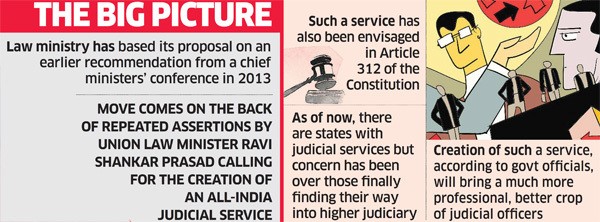- Home
- Prelims
- Mains
- Current Affairs
- Study Materials
- Test Series
 EDITORIALS & ARTICLES
EDITORIALS & ARTICLES
Will a national judiciary work?
The Union government appears to be steadfast in its resolve to implement reforms in recruitment and appointment to the subordinate judicial services.
 Need for All India Judicial Service (AIJS)
Need for All India Judicial Service (AIJS)
 Need for All India Judicial Service (AIJS)
Need for All India Judicial Service (AIJS)
- Removal of intervention in judicial appointment: It was in 1961 that a proposal for an All-India Judicial Service was first suggested in the Chief Justices’ Conference as a way to remove any scope for judicial or executive intervention in the appointments to the judiciary.
- Low judge to population ratio: A Law Commission report in the year 1987 recommended that India should have 50 judges per million population as against 10.
- In 2021, the working strength of the subordinate judiciary was 19,318 against the sanctioned strength of 24,247 which implies almost 5,000 posts remain vacant.
- Lack of good quality judicial officers: The continuous decline in their quality will delay delivery of justice, increase pendency of cases, impair quality of judgments, and in turn affect the competence of higher judiciary as well.
- Low budgetary support to state governments: The state judicial services are not attractive for ‘best talents’ due to low salaries, rewards and compensations by the state governments.
- Non-availability of specialized state training institutions: Adjudication is a specialization which requires state of the art training institutes and professors but state institutes don’t allow such exposure to interns.
- Article 233(1) of the Constitution lays down that the appointments of persons to be, and the posting and promotion of, district judges in any State shall be made by the Governor of the State in consultation with the High Court exercising jurisdiction in relation to such State.
- The 42nd Constitutional amendment in 1976 amended Article 312 (1) empowering Parliament to make laws for the creation of one or more All India Services, including an AIJS.
- Equal Representation: It will address the issue of social inclusion by enabling suitable representation to marginalised and deprived sections of the society.
- Strengthening of judiciary system: A properly framed All India Judicial Service (AIJS) on the lines of other all-India services such as IAS and IPS is important to strengthen the overall justice delivery system.
- Appointment of fresh legal talent: It will give an opportunity for induction of suitably qualified fresh legal talent selected through a proper all-India merit selection system.
- Promotion of accountability and transparency: A career judicial service will make the judiciary more accountable, more professional, and arguably, also more equitable.
- Infusion of objectivity in recruitment: The open competitive exam would bring objectivity in the recruitment process of judiciary by reducing discretion of selection panel.
- Uniformity across the country: Quality of adjudication and the dispensation of justice would attain uniformity across the country by ironing out state-level differences in laws, practices and standards.
- Lack of consensus among states: The consultative process of AIJS was mooted in 2019 and only four States and two High Courts supported the proposal.
- Eight States have rejected it, five suggested changes, and 11 are yet to respond.
- Existence of dichotomy with regard to Articles 233 and 312: The Clause 3 of Article 312 places a restriction that AIJS shall not include a post inferior to that of a district judge.
- It paves the way for Parliament to enact laws with regard to Administration of Justice; constitution and organisation of all courts, except the Supreme Court and the High Courts.
- It was essentially intended to be the prerogative of the State but will now be the prerogative of the Union.
- Violating principle of federalism: If the fundamental power of the States to make such rules and govern the appointment of district judges is taken away, it may be against the principle of federalism and the basic structure doctrine.
- Divergence among state governments and high courts: While some state governments and high courts favoured the proposal, some were not in favour of creation of AIJS, while some others wanted changes in the proposal formulated by the central government.
- Language barrier: If all India judiciary is applied in India then judges from different states will be posted in different regions thus, they will face high language barrier which can affect the quality of adjudication.
- Against independence of the judiciary: It is guaranteed by the constitution but by applying All India Judicial services, we will be giving away the power to appoint judges solely to the executive.
- The feasibility of the AIJS in the current context requires to be studied, especially when reliance is placed upon archaic reports of the Law Commission.
- It is for the Union to dispel doubts and at the same time give wings to the aspirations of all stakeholders when implementing the proposal.
- It is necessary to create a robust judicial system at the subordinate level and a rich pool to draw from for the appointment of high court.
- A meritocratic service with a competitive recruitment, high-quality uniform training and assured standards of probity and efficiency would be able to ensure speedy and impartial justice in India.









 Latest News
Latest News General Studies
General Studies